The counterculture of the 1960s, the Egyptian revolution of 2011 and the occupation of Taiwan’s Legislative Yuan this year are among the social movements across generations and nations that come under the spotlight at this year’s New Taipei City Film Festival (新北市電影節). The diverse lineup of 76 feature, short, documentary and animated films screened at venues in the city’s Banciao District (板橋) runs until Sept. 28.
Under the direction of poet, theater and film director Yen Hung-ya (閻鴻亞), known also by the pen name Hung Hung (鴻鴻), and film critic Ryan Cheng (鄭秉泓), the annual festival has become known as a showcase for socially-conscious film.
This year’s theme deals with how societies past and present have been shaped in different corners of the world, and how they are reflected, translated and communicated through the cinematic medium.

Photo courtesy of New Taipei City Film Festival
“The emphasis is on reality, since the inhabitants of Taiwan usually pay little attention to what is happening in the rest of the world,” says Cheng, the festival’s co-curator.
35MM CLASSICS
Among the selected works, two classics are particularly valuable because they will be shown in the rare 35mm format. Nagisa Oshima’s 1960 Night and Fog in Japan is a formally and politically daring work that explores the collective failure of Japan’s left-wing movement in the aftermath of the ratification of the second Japan-US Security Treaty in 1960. Across the Pacific Ocean, the student revolts of the 1960s are brought to life through The Strawberry Statement (1970), which is loosely based on the protests at Columbia University in 1968.
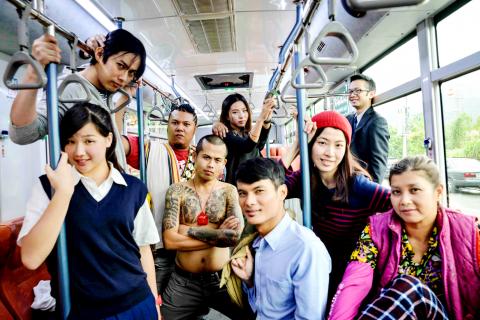
Photo courtesy of New Taipei City Film Festival
Chinese visual artist Xu Ruotao (徐若濤) radically re-imagines China’s Cultural Revolution (1966 to 1976) with the experimental Rumination (反芻, 2009).
CIVIL RESISTENCE
Fast-forward to the 21st century, After the Battle tackles the aftermath of the Arab Spring with a love story between a female activist from a wealthy family in Cairo and a poor horseman who is among the men on camels and horses violently charging protestors in Tahrir Square in February of 2011.
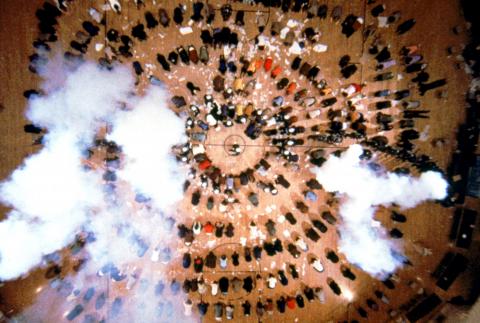
Photo courtesy of New Taipei City Film Festival
With Redacted (2007), director Brian De Palma turns his confrontational and furious gaze to the war in Iraq to fictionalize a true event in which a teenage Iraqi girl was raped and killed together with her parents and sister.
Back home, US-based academic Ed Hsu (許介文) and Taiwanese filmmaker Tsai Chau-ming (蔡朝銘) attempt to capture the varied ideas and faces of the Sunflower movement with One Voice: Occupying Taiwan Congress (島嶼之聲: 太陽花裡聽見十個台灣族群), a collection of interviews with participating protestors of different ethnic backgrounds.
TEAR DOWN THE WALL
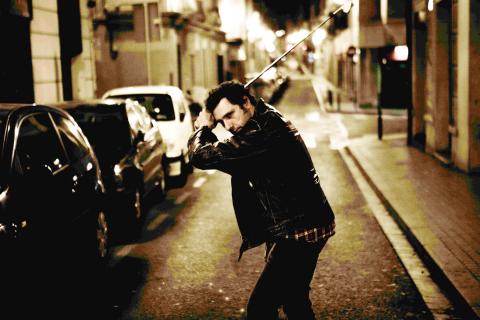
Photo courtesy of New Taipei City Film Festival
As this year marks the 25th anniversary of the fall of the Berlin Wall, festival organizers are spotlighting Konrad Wolf (1925-1982), an important East German director who, despite working within the state-owned film studio under the Stalinist dictatorship, was able to make films that dwell upon the complexity of humanity, while calling into question the totalitarian system.
Five works are selected to represent the different phases of Wolf’s filmmaking career, including the Cannes-winning Stars (1959), which tells of the tragic love of a Jewish girl and a Nazi officer, Goya (1971), a period drama about the Spanish painter which is said to be the director’s critique of the communist party’s tight control over cultural activities, and Solo Sunny (1980), Wolf’s last and most popular film, which centers on a young heroine who lives like a Bohemian and dreams of becoming a punk rock star in the Communist state where rock ‘n’ roll is banned.
Also noted for introducing directors and filmmaking talents who are little known in Taiwan, the festival brings two documentaries by British photographer and documentary director Leo Maguire. With Dogging Tales, Maguire makes a controversial night-time journey to examine how and why people engage in or watch sexual activities in front of strangers in public. A powerful study of the violent, fighting culture among gypsy men, Gypsy Blood, follows two families in which the males have learned to settle disagreements with their bare knuckles — a tradition they pass on to their sons.
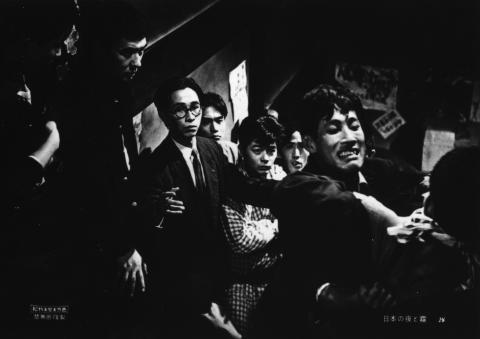
Photo courtesy of New Taipei City Film Festival
First discovered by the Kaohsiung Film Festival (高雄電影節), Albert Ventura Roldan will show three short films to the audience in Taipei. Born and raised in Barcelona, Spain, and married to a Taiwanese wife, Roldan draws his artistic inspiration from the cinema of Alfred Hitchcock and expresses great interest and talent in making dark thrillers.
520 Huilan (520慧蘭), made with a Taiwanese crew, is his latest work about how a hijack prank turns into reality.
Both Maguire and Roldan will attend question-and-answer sessions after screenings of their works. For more information, go to www.ntpcff.com.tw.

Photo courtesy of New Taipei City Film Festival

The canonical shot of an East Asian city is a night skyline studded with towering apartment and office buildings, bright with neon and plastic signage, a landscape of energy and modernity. Another classic image is the same city seen from above, in which identical apartment towers march across the city, spilling out over nearby geography, like stylized soldiers colonizing new territory in a board game. Densely populated dynamic conurbations of money, technological innovation and convenience, it is hard to see the cities of East Asia as what they truly are: necropolises. Why is this? The East Asian development model, with

Desperate dads meet in car parks to exchange packets; exhausted parents slip it into their kids’ drinks; families wait months for prescriptions buy it “off label.” But is it worth the risk? “The first time I gave him a gummy, I thought, ‘Oh my God, have I killed him?’ He just passed out in front of the TV. That never happens.” Jen remembers giving her son, David, six, melatonin to help him sleep. She got them from a friend, a pediatrician who gave them to her own child. “It was sort of hilarious. She had half a tub of gummies,

The wide-screen spectacle of Formula One gets a gleaming, rip-roaring workout in Joseph Kosinski’s F1, a fine-tuned machine of a movie that, in its most riveting racing scenes, approaches a kind of high-speed splendor. Kosinski, who last endeavored to put moviegoers in the seat of a fighter jet in Top Gun: Maverick, has moved to the open cockpits of Formula One with much the same affection, if not outright need, for speed. A lot of the same team is back. Jerry Bruckheimer produces. Ehren Kruger, a co-writer on Maverick, takes sole credit here. Hans Zimmer, a co-composer previously, supplies the thumping
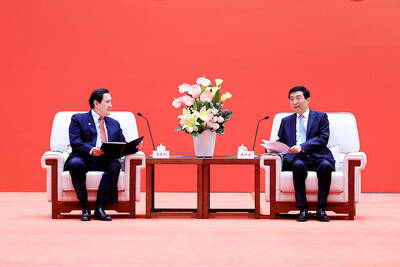
There is an old British curse, “may you live in interesting times,” passed off as ancient Chinese wisdom to make it sound more exotic and profound. We are living in interesting times. From US President Donald Trump’s decision on American tariffs, to how the recalls will play out, to uncertainty about how events are evolving in China, we can do nothing more than wait with bated breath. At the cusp of potentially momentous change, it is a good time to take stock of the current state of Taiwan’s political parties. As things stand, all three major parties are struggling. For our examination of the